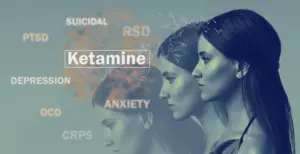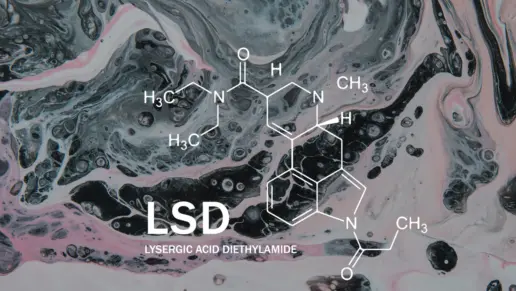Ketamine is a drug that is approved by the FDA for use as an anesthetic during surgery or acute trauma settings to manage pain. Ketamine is not officially approved for use in treating psychiatric illnesses such as depression but some doctors have started prescribing ketamine therapy as a way of treating some mental health conditions.
Ketamine has also become a popular recreational drug due to its hallucinogenic and sedative effects. Young people commonly use it at clubs and parties.
What Is Ketamine?
Is ketamine an opioid? No, this drug is not an opioid although it may mimic some of the same effects as opioids. Is ketamine a hallucinogenic? Ketamine is an anesthetic that causes dissociation and sometimes hallucinogenic effects.
Some of the common street names for this drug include:
- Cat Tranquilizer
- Cat Valium
- Jet K
- Kit Kat
- Purple
- Special K drug
- Special La Coke
- Super Acid
- Super K
- Vitamin K
It distorts perceptions of sight and sound and makes the user feel detached from their environment and surroundings. The drug can also cause a feeling of being sedated, calm and relaxed. It is sometimes abused as a way to facilitate sexual assault.
Ketamine comes in either powder or liquid form. Users can snort or smoke the powder form. Liquid ketamine can be mixed into drinks or injected.
Side Effects of Ketamine

The first effects of ketamine occur rapidly within a few minutes of taking it. Some of the side effects you may experience with this drug include:
- Agitation
- Depression
- Cognitive difficulties
- Unconsciousness
- Amnesia
- Nausea
- Increase in heart rate and blood pressure
- Involuntary rapid eye movement
- Dilated pupils
- Salivation
- Stiffening of muscles
- Immobility
Some people experience certain side effects even several weeks after taking the drug if they experience something called hallucinogen persisting perception disorder (HPPD).
Can You Overdose on Ketamine?
Taking too much ketamine can lead to an overdose or ketamine toxicity. Signs to look for in an overdose include:
- Slowed breathing
- High blood pressure
- Increased or irregular heartbeat
- Seizure
- Coma
- Unconsciousness
If you or a loved one experiences any of these symptoms then seek medical attention immediately.
Health Risks Associated with Ketamine Use
There are short term and long term health risks associated with ketamine use:
- Psychosis
- Addiction
- Amnesia
- High blood pressure
- Impaired motor function
- Seizures
- Respiratory complications
- Impaired coordination and judgment
- Risk of depression
- Ketamine induced ulcerative cystitis
Rehab and Treatment for Ketamine Use
There are many different treatment options for ketamine abuse or addiction to ketamine. Depending on your specific needs, you may benefit from one or some of the following options.
Detox
Detox is the process your body goes through as a drug is leaving your system. Many treatment programs will begin with detox that is supervised by medical staff to ensure that you can safely cope with any withdrawal symptoms. Some people who use ketamine have flashbacks, vivid memories, or recurrences of sensory distortions when they stop using ketamine. You may be prescribed medications, such as a selective serotonin reuptake inhibitor (SSRI), to help manage these symptoms.
Inpatient Treatment
Another common treatment option is inpatient care for ketamine addiction. Inpatient treatment requires you to stay overnight at the facility and attend multiple appointments throughout the day with various staff. This type of care is recommended for many patients who are starting out their recovery journey and need more hands on support.
Outpatient Treatment
Outpatient treatment is very similar to inpatient treatment but you do not stay overnight at the facility. The treatment team will assign you various appointments to attend throughout your week including medical checkups, counseling sessions and support groups.
Aftercare
Your recovery team will also put together an aftercare plan to ensure that you continue your journey after leaving treatment. Relapse is a common experience with substance use disorders, which is why this step is an important one in the process. Aftercare may include follow up appointments with doctors and therapists. It may also include regular attendance at local support groups.
Featured Facilities Near You
Finding facilities near you…




